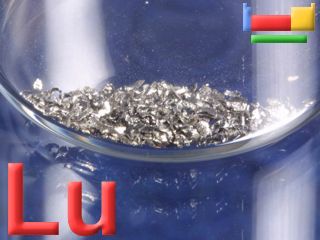Lutetium: the essentialsBrief description: pure metal lutetium has been isolated only in recent years and is one of the more difficult to prepare. It can be prepared by the reduction of anhydrous LuCl3 or LuF3 by an alkali or alkaline earth metal. The metal is silvery white and relatively stable in air. It is a rare earth metal and perhaps the most expensive of all rare elements. It is found in small amounts with all rare earth metals, and is very difficult to separate from other rare elements.
IsolationIsolation: lutetium metal is available commercially so it is not normally necessary to make it in the laboratory, which is just as well as it is difficult to isolate as the pure metal. This is largely because of the way it is found in nature. The lanthanoids are found in nature in a number of minerals. The most important are xenotime, monazite, and bastnaesite. The first two are orthophosphate minerals LnPO4 (Ln deonotes a mixture of all the lanthanoids except promethium which is vanishingly rare) and the third is a fluoride carbonate LnCO3F. Lanthanoids with even atomic numbers are more common. The most comon lanthanoids in these minerals are, in order, cerium, lanthanum, neodymium, and praseodymium. Monazite also contains thorium and ytrrium which makes handling difficult since thorium and its decomposition products are radioactive. For many purposes it is not particularly necessary to separate the metals, but if separation into individual metals is required, the process is complex. Initially, the metals are extracted as salts from the ores by extraction with sulphuric acid (H2SO4), hydrochloric acid (HCl), and sodium hydroxide (NaOH). Modern purification techniques for these lanthanoid salt mixtures are ingenious and involve selective complexation techniques, solvent extractions, and ion exchange chromatography. Pure lutetium is available through the reduction of LuF3 with calcium metal. 2LuF3 + 3Ca → 2Lu + 3CaF2 This would work for the other calcium halides as well but the product CaF2 is easier to handle under the reaction conditions (heat to 50°C above the melting point of the element in an argon atmosphere). Excess calcium is removed from the reaction mixture under vacuum. WebElements ShopWebElements now has an online shop at which you can buy periodic table posters, mugs, T-shirts, games, molecular models, and more. |
|||||||||
|
|




 Lutetium
Lutetium Lutécium
Lutécium Lutetium
Lutetium Lutetium
Lutetium Lutezio
Lutezio Lutecio
Lutecio Lutetium
Lutetium Lutécio
Lutécio